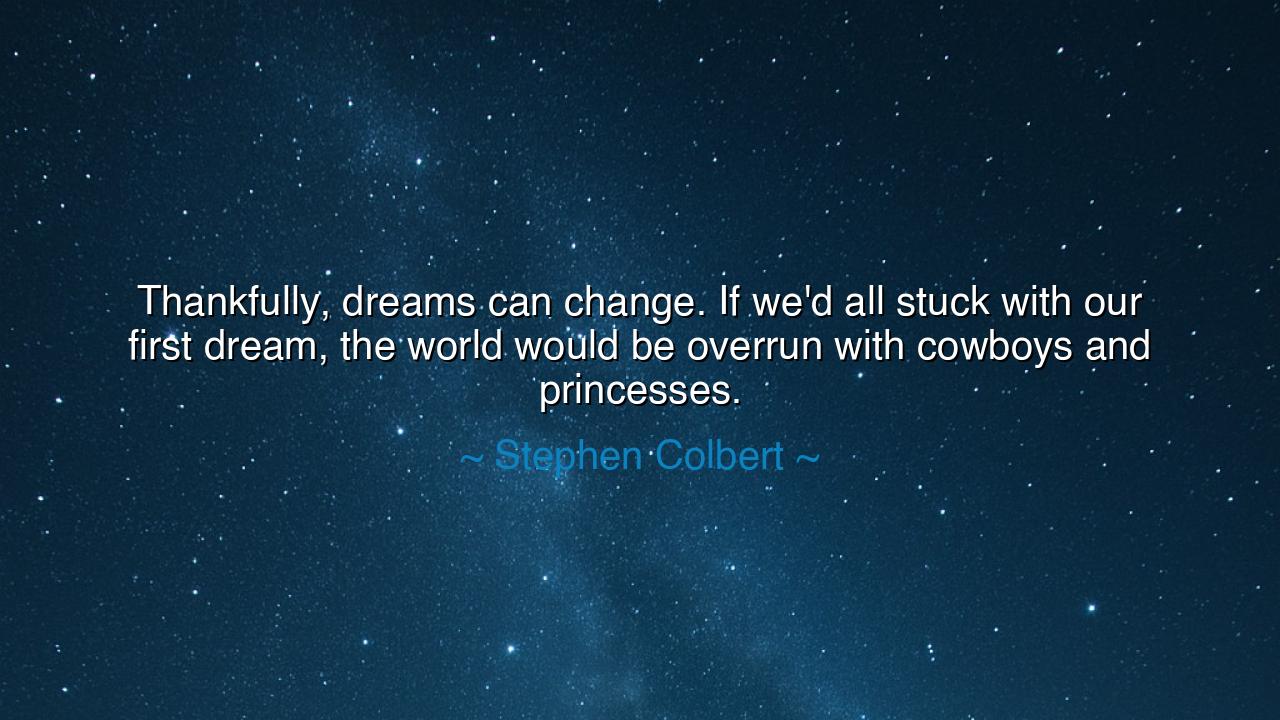
Thankfully, dreams can change. If we'd all stuck with our first
Thankfully, dreams can change. If we'd all stuck with our first dream, the world would be overrun with cowboys and princesses.






In this playful yet profoundly wise reflection, Stephen Colbert, the jester-philosopher of our age, declares: “Thankfully, dreams can change. If we’d all stuck with our first dream, the world would be overrun with cowboys and princesses.” Beneath the humor of his words lies a truth as old as the human heart — that the path of becoming is not straight, but shifting like a river through time. Colbert, with the insight of one who has worn many masks — comedian, scholar, satirist, seeker — reminds us that the dreams we begin with are not the dreams we must end with. Life reshapes our desires as surely as the tide reshapes the shore. The courage to change is as noble as the courage to begin.
When we are young, our dreams are pure reflections of imagination. They are the bright seeds of what we might become — cowboys who ride into the sunset of adventure, princesses who dwell in castles of grace and wonder. These early visions are not false; they are the first language of the soul. But as we grow, the world whispers new truths. We learn of loss, of duty, of the intricate weave of human destiny. And in that learning, our dreams evolve. What once was fantasy becomes purpose. The child’s wish becomes the adult’s calling. To cling forever to the first dream would be to deny the deeper symphony of the spirit, which changes key as we mature.
Stephen Colbert, known for his wit, speaks here as a man who himself has lived this evolution. Before becoming one of America’s most celebrated voices of humor and reflection, he once dreamed of being a serious dramatic actor. He studied theater, yearning for tragedy and Shakespearean gravitas. But fate, ever mischievous, led him toward comedy — a realm he had not planned to enter. Yet it was there, in the laughter of others, that he found his true vocation. Through satire, he became not merely an entertainer, but a mirror to society, teaching through joy and irony. His life itself is proof that when dreams change, they do not die — they transform, revealing a truer version of ourselves.
History, too, offers many such examples. Consider Charles Darwin, who once intended to become a clergyman. His early dream was of faith and scripture. Yet through curiosity and observation, his path diverged into science, leading him to uncover the laws of evolution — the very principle that life itself adapts and transforms to survive. His changing dream did not betray his purpose; it fulfilled it. For just as species evolve, so too do our ambitions, molded by time, by wisdom, by necessity. The true tragedy is not that dreams change, but that some hearts grow too rigid to allow them to.
There is deep mercy in the ability to outgrow one’s old dreams. For many souls, the journey toward fulfillment demands shedding identities that no longer fit. The artist may become a teacher, the athlete a philosopher, the wanderer a builder of homes. What matters is not the label, but the continuity of spirit — the thread of authenticity that runs through all transformations. To change one’s dream is not to betray the child within, but to honor that child’s curiosity in fuller, wiser form. The dream of the cowboy becomes the leadership of the pioneer; the dream of the princess becomes the compassion of the healer. All are evolutions of love.
Yet, Colbert’s humor conceals a deeper caution. The world would indeed be overrun with cowboys and princesses if we never allowed ourselves to grow. Too many remain prisoners of old ambitions, afraid to admit that they have changed. They mistake consistency for integrity, fearing that to alter course is weakness. But true wisdom lies in flexibility — in listening to the shifting winds of one’s own becoming. Just as trees bend in storms yet remain rooted, the wise soul adjusts without losing its core. The refusal to evolve is the beginning of decay; the willingness to adapt is the beginning of wisdom.
So, my child, take this teaching to heart: do not fear the changing of your dreams. Each stage of life reveals new desires, new truths, new strengths waiting to be born. When one dream fades, another waits behind it, clearer and closer to the essence of who you are. Embrace that unfolding. Follow where growth leads, even if it means letting go of what once defined you. For the purpose of life is not to remain who you were, but to become who you are meant to be.
In the end, as Stephen Colbert reminds us with a smile, it is not the child’s dream that defines the adult, but the courage of the adult to keep dreaming — anew, again, and always. So let your dreams change. Let them breathe, evolve, and expand. For in their transformation lies your own — and through that, the world itself grows wiser, kinder, and more alive.






AAdministratorAdministrator
Welcome, honored guests. Please leave a comment, we will respond soon